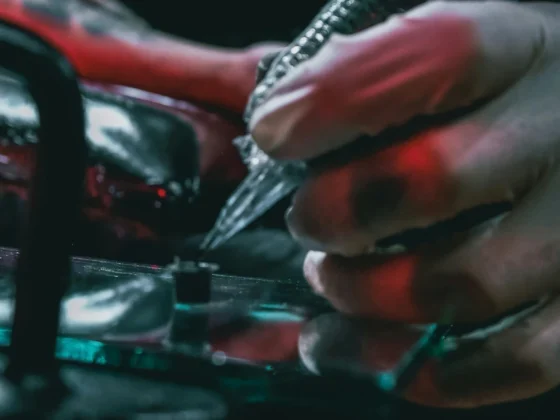Inked Mag Staff
July 19th, 2018
Should You Get a Tattoo While Pregnant? Here’s the Facts!
Yes or No? When a woman is pregnant people automatically feel obliged to give advice. It’s just a natural inclination, especially from women who have already gone through the beauty…
Yes or No?
When a woman is pregnant people automatically feel obliged to give advice. It’s just a natural inclination, especially from women who have already gone through the beauty and pain of giving birth. Everyone wants the mother and child to be healthy and everyone has their opinion on how the mom-to-be can insure that’s exactly what happens. And we have to admit that most of the advice is probably pretty sound based on the fact that these tried and true moms have gone through it all already, some even multiple times.
However, when the advice is about whether a pregnant woman should get tattooed, well, there the experience factor drops and many women (and men) just start shooting from the hip and giving advice based on their sole opinion and hearsay.
So, if you are pregnant or know someone who is, or are just curious about the topic, here is some sound advice on what to do and what not.

If you do … it may lead to infection
A doctor’s main concern for their pregnant patient is infection and we know that not all tattoo shops are abide by the same strict standard rules of hygiene. And we’re talking blood borne infections here — staph, hepatitis B, hepatitis C and HIV.
These diseases are dangerous whether a woman is pregnant or not, but in this case contracting one of these conditions while carrying a child can easily lead to the infection being passed on to the unborn baby.
Ok, let’s say you decided to get inked. These are the symptoms to watch out for post tattoo. And if they occur see your doctor immediately.
- fever
- chills
- pus or red lesions on the tattoo
- foul smelling discharge from the area of the tattoo
- areas of hard, raised tissue
- new dark lines developing in or radiating around the area

If you do…it may double the pain
Thankfully the tramp stamp has gone out of vogue, however there are still woman who get work done on their lower backs. Well, this is exactly where an epidural is administered. Granted a tattoo only takes a few weeks to heal, so unless you had the work done within that time frame you could be looking for trouble. HOWEVER, what if you are outside the two week window, but the tattoo gets infected. Then you will have to pass on the epidural. Also, some epidural leave scar tissue which may impact the look of your tattoo.
So, if you are planning on getting thorough the pain of child birth by having an epidural you should wait to get inked there until after you have the baby.
If you do…it may look different after pregnancy
As you can well imagine a woman’s body goes through all kinds of hormonal changes and fluctuations while pregnant, and some of these affect the skin. The consensus is to avoid any tattoos on the stomach or hips, even months before giving birth because of a condition that commonly occurs striate gravid arum — better known as stretch marks!
However, there are a host of other skin conditions that can erupt during pregnancy that can make getting tattoo even more painful than usual and difficult for the artist to render. Some of them are:
Pruritic urticarial papules and plaques of pregnancy (PUPPP): is a chronic hives like rash that strikes some women during pregnancy. Although extremely annoying for its sufferers (because of the itch), it presents no long-term risk for either the mother or unborn child. PUPPP frequently begins on the abdomen and spreads to the legs, feet, arms, chest, and neck
Prurigo of pregnancy: is a benign non-specific pruritic (itchy) papular rash that arises during pregnancy. This itchy rash is made up of small bumps called papules and it may last for several months after delivery.
Impetigo herpetiformis: Although rare this rare condition usually starts in the second half of pregnancy and is considered a form of psoriasis. In addition to the skin irritation it can cause nausea, vomiting, fever, and chills.
Hyperpigmentation caused by hormonal changes this condition causes the skin in certain areas of the body from her nipples to her face to darken. The technical term is Melasma but is also known as the “mask of pregnancy,”. This is a very common condition that is experienced by up to 70% of pregnant women.

If you do…how to do it safely
The practices employed in regard to looking for a safe shop to get tattooed should be used anytime someone is thinking of getting inked. Here’s what to look for:
- Find a tattoo artist who has single-use, “throw-away” kits that are individually packaged, dated, and sealed and hold disposable needles and tubes. Watch your tattoo artist remove the new needle and tube from its sealed envelope immediately before your session.
- Make sure that the tattoo parlor is fully licensed (if your state regulates tattoo parlors), and that your tattooist has a great deal of experience, even if that means driving across county lines to find a licensed shop.
- Make sure the artist wears sterile disposable gloves for each client and use sterile disposable towels, much as you’d expect from your dentist.
- Watch a procedure first to make sure that unsterile surfaces and equipment are not touched by the tattoo artist once the procedure has begun.
- Look for telltale signs of sloppy tattoo practices, such as blood splatter, dirty work surfaces, the absence of red “sharps disposal containers,” and a lack of infection-control practices.
- Ask where the ink was manufactured and procured. “It’s best if the ink comes from a large manufacturer that has been in business a long time, and even better if the artists have tried the ink on themselves,” says Byron Kennedy, M.D., deputy director of health for Monroe County, N.Y., and the lead author of the NEJM story. The contaminated ink in the recent outbreak came from a small retailer, he pointed out.
- Ask if the inks used are made of nonmetallic organic pigments.
- The studio should have a separate tattooing are and piercing area. If something doesn’t look right, or appear clean, say something.
If you are not showing that obviously, it doesn’t hurt to alert the artist that you are pregnant. And like anytime you are getting tattooed if you don’t feel comfortable with the shop or artist, just leave.
If at any time you feel unsure or uncomfortable, leave. After all, it’s better to be safe than sorry.
If you don’t…consider getting a henna tattoo
We are not big on getting fake or temporary tattoos, however henna or mehndi is neither of those. It is a beautiful and ancient art used for centuries in areas of South Asia, North Africa, and the Middle East and now there are many experienced women in the United States who can apply the art to your skin.
In fact, in some cultures a traditional henna celebration is performed on expectant mothers to ward off evil spirits.
Although the paste is generally made from safe ingredients, like henna powder, water, and sugar, there have been cases of women getting very ill as an allergic reaction to the ingredients.
So, should you, or shouldn’t you?
The answer is totally up to you. There are risks involved and you could wait till after your pregnancy to celebrate with some new ink, or you can do your due diligence and stack the odds in your favor that all will be alright.
The decision is yours, but we hoped these bits of information will help you make your decision.
We have to end this article with mentioning that we know VERY few artists who would tattoo a pregnant woman. They feel it just isn’t worth the risk
Editor's Picks
Bridging Classical Art and Modern Tattooing
Esteban Rodriguez brings the discipline of classical fine art to the living canvas of skin, creating hyper-realistic tattoos that merge technical mastery with emotional depth.
Show Your Ink Fashions Brings Custom Style to Tattoo Culture
Show Your Ink Fashions creates custom shirts designed to showcase your tattoos as wearable art, blending fashion with personal expression.
The Ultimate “Superman” Tattoo Roundup: Just in Time for Superman’s Return to Screens
With Superman’s big return to theaters, fans are revisiting some of the most iconic ink inspired by the Man of Steel.














